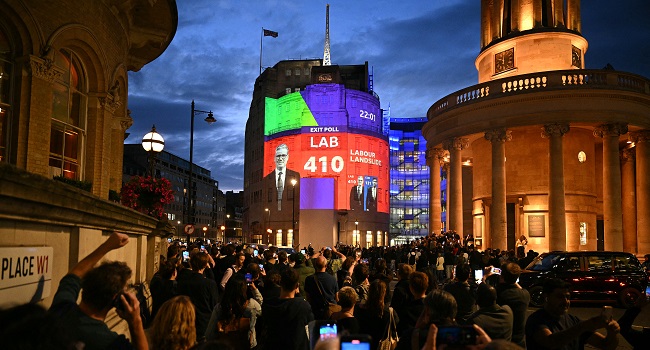
Britain’s main opposition Labour Party is poised for a decisive victory, according to exit polls released on Thursday, potentially ending 14 years of Conservative governance characterized by financial austerity, Brexit tensions, and political scandals.
The exit poll, conducted as polling stations closed at 10:00 pm (2100 GMT), predicts that the centre-left Labour Party will secure 410 seats in the 650-seat House of Commons. In contrast, the Conservatives are projected to win only 131 seats. This outcome signals a significant shift from the right-wing dominance of recent years.
In addition, the smaller opposition Liberal Democrats are expected to gain 61 seats, while Nigel Farage’s anti-immigration Reform UK could secure 13 seats.
As counting began nationwide, Labour leader Keir Starmer appears set to replace Rishi Sunak as Prime Minister. Official results are anticipated from late Thursday into Friday.
The predicted Labour victory breaks with recent trends among Britain’s allies, where far-right movements have been gaining traction. For instance, the National Rally in France is eyeing power, and Donald Trump is positioned for a potential return in the United States.
Under Britain’s first-past-the-post system, a party needs 326 seats to achieve a parliamentary majority. If the results align with the exit poll, Starmer will meet with King Charles III to form a new government. Ministerial appointments are expected soon after his acceptance speech at Downing Street.
The result would mark a dramatic rise for Starmer, 61, who became Labour leader in 2020. Since taking over from Jeremy Corbyn, Starmer has repositioned Labour towards the centre, making the party more electable and addressing internal conflicts and allegations of anti-Semitism.
Despite a subdued campaign, Labour has maintained a consistent 20-point lead over the Conservatives in opinion polls for nearly two years, adding to the sense of an impending Labour triumph.
Starmer has pledged “a decade of national renewal,” though he faces significant challenges, including slow economic growth, underfunded public services, and financial pressures on households. He also aims to restore political integrity after a turbulent period of five Conservative prime ministers.
Starmer’s immediate responsibilities will include representing Britain at the NATO conference in Washington and hosting a European leaders’ summit later this month.








